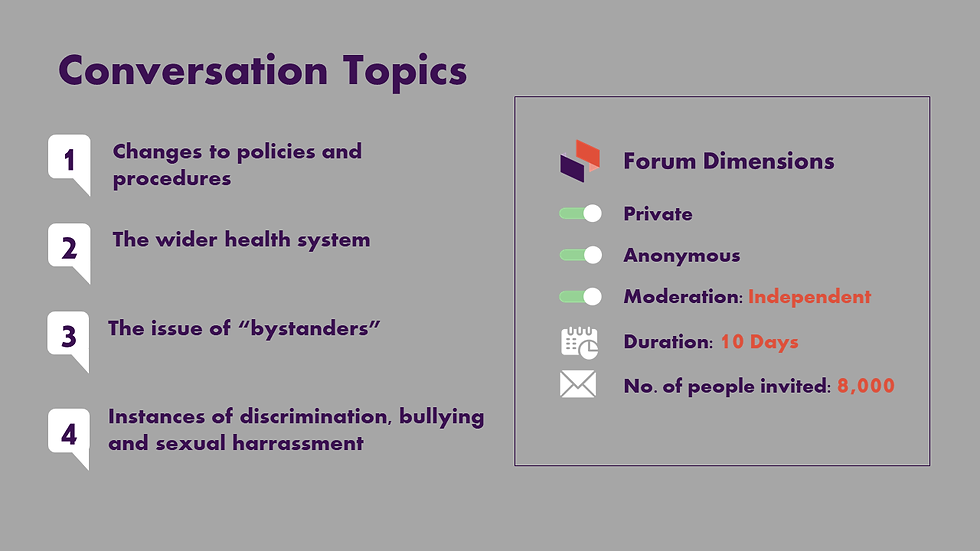CASE STUDY: A Medical Profession Gives Members a Voice on Harassment
- Plaetos Group

- Apr 1, 2020
- 2 min read
Updated: Feb 25, 2022

Confronting allegations of sexual harassment, discrimination and bullying within a regional surgical profession aired on a prominent current affairs program. The professional body governing the conduct of surgeons needed to respond and act fast.
Using Plaetos, they heard from all members, especially the most vulnerable, and were able to understand what was going on, why it was happening and how to fix it.
THE CHALLENGE
Confronting allegations of sexual harassment, discrimination and bullying within a regional surgical profession were aired on a prominent current affairs program
Many months’ media scrutiny of practices in the once venerable profession followed
The professional body governing the conduct of surgeons set up an independent process to make recommendations for change.
The College needed to hear from all members, and to respond in particular to the needs of vulnerable members and understand what was going on, why it was happening and how to fix it.
THE APPROACH
The independent Expert Advisory Group (EAG) advising the professional College convened four private Plaetos forums. Two of the forums were fully anonymous, enabling the trainees and international medical graduates the psychological safety to talk candidly about their experiences, their fears and hopes for change. The forums ran in parallel to a traditional research program involving surveys and interviews.
A two-phase process over 10 days’ discussion enabled members to voice their often different experiences, and say how and what the organization needed to change to protect members from harm, and protect the reputation of the profession.
The Engagement Process
Members were invited to comment on topics within the EAG Draft Issues Paper. Discussion topics included: changes to policies and procedures, the wider health system, the issue of “by-standers”, and instances of discrimination, bullying and sexual harassment. After the forum, the Plaetos data report was provided to the EAG for inclusion in their response to the College.

THE RESULTS
Forum participants revealed that until Plaetos, there had never been an avenue to speak out without fear of retribution. There were sections of the profession with low trust.
Some candid, arresting member experiences galvanised the College’s transformation program. The Plaetos program was delivered in 1/4 the time and at 1/8th the cost of the traditional survey and interview program.
The College responded to the Expert Advisory Group’s final paper with an action plan that started with:
Issuing a public apology to its members
Filling gaps in training, education and policy
Establishing partnerships with employers and others in the health sector
Actively holding practitioners and employers to account against agreed standards
Meeting its duty of care to trainees
Making it safe for people to raise concerns without fear of retribution
Taking on other recommendations spanning culture and leadership, and;
Improving surgical training and complaints handling processes.
PLAETOS HELPED US UNDERSTAND THE PROBLEMS
Plaetos helped the industry body show their people that they wanted and valued their stories. Individuals were able to share their experiences candidly, without fear of repercussions, so the EAG could better understand the problems and recommend ways to stop them.
“We needed to show people that we wanted and valued their stories. [Plaetos] did that, and it allowed [us] to ask questions - and be seen to ask questions - that helped us understand the problems. I liked the ability to move through to an outcome.” —Expert Advisory Group secretariat





Comments